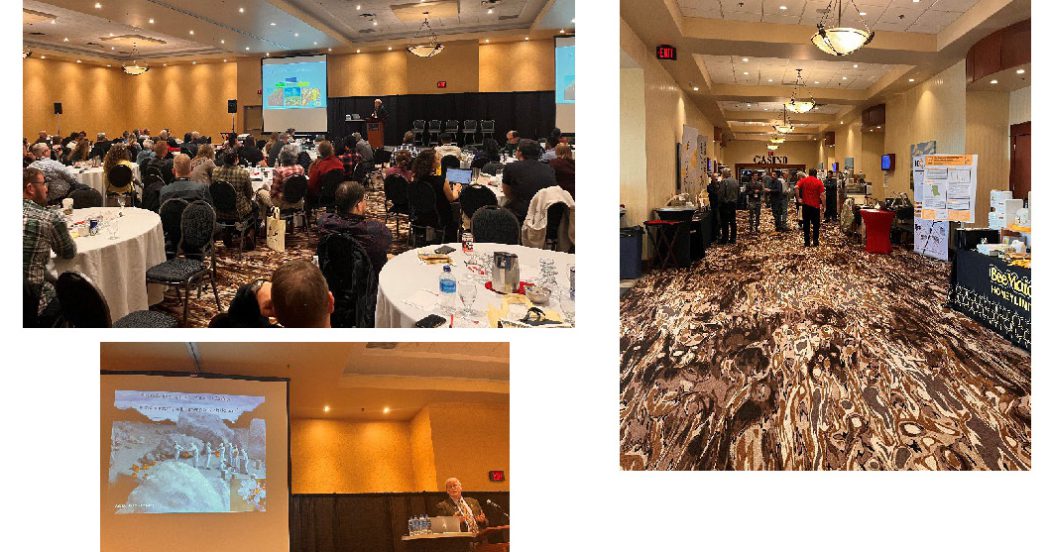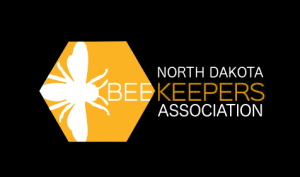By: Nicole McCormick
Originally published in the Bee News

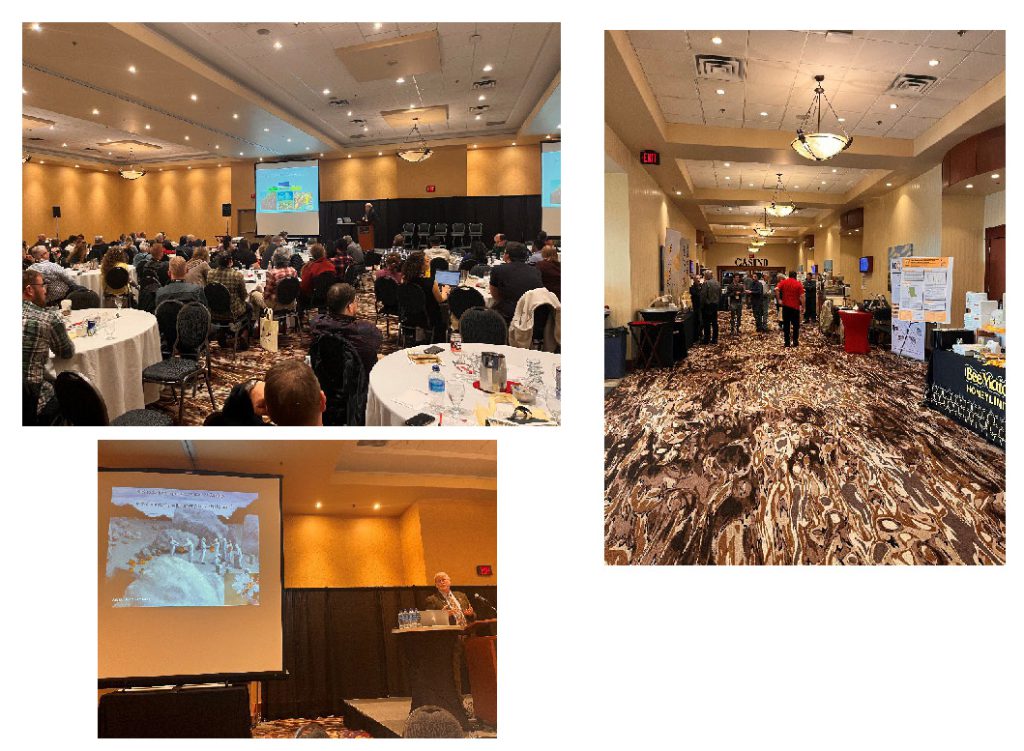 On February 9th and 10th, the Canadian Honey Council (CHC) and the Canadian Association of Professional Apiculturists (CAPA) organized the first ever Bee Tech – a Canadian national beekeeping convention and tradeshow. With over 250 registrants, the event brought together researchers, producers and industry representatives from various parts of Canada and the world. The convention featured a diverse group of over 50 presenters which included six panels that engagingly discussed important areas of beekeeping. Presentation topics ranged from honey bee diseases and pests, Tropilaelaps mites and Varroa mite treatments, to blueberry and canola pollination, honey bee nutrition, honey prices, queen health/production and stock replacement. The trade show showcased numerous exhibitors and research posters, offering attendees the opportunity to engage with businesses and stay updated on the latest research findings. The banquet on the first night was a sold-out affair that included an entertaining talk from Jamie Macoun and locally crafted drinks using Alberta honey from Fallentimber Meadery and Blindman Brewing. Bee Tech proved to be an excellent platform for networking on a national scale, fostering valuable connections, insightful conversations, and significant learning experiences. Thank you to all the attendees, speakers and vendors that shared their knowledge and expertise, and to Shelley Hoover and Rod Scarlett for organizing this informative event!
On February 9th and 10th, the Canadian Honey Council (CHC) and the Canadian Association of Professional Apiculturists (CAPA) organized the first ever Bee Tech – a Canadian national beekeeping convention and tradeshow. With over 250 registrants, the event brought together researchers, producers and industry representatives from various parts of Canada and the world. The convention featured a diverse group of over 50 presenters which included six panels that engagingly discussed important areas of beekeeping. Presentation topics ranged from honey bee diseases and pests, Tropilaelaps mites and Varroa mite treatments, to blueberry and canola pollination, honey bee nutrition, honey prices, queen health/production and stock replacement. The trade show showcased numerous exhibitors and research posters, offering attendees the opportunity to engage with businesses and stay updated on the latest research findings. The banquet on the first night was a sold-out affair that included an entertaining talk from Jamie Macoun and locally crafted drinks using Alberta honey from Fallentimber Meadery and Blindman Brewing. Bee Tech proved to be an excellent platform for networking on a national scale, fostering valuable connections, insightful conversations, and significant learning experiences. Thank you to all the attendees, speakers and vendors that shared their knowledge and expertise, and to Shelley Hoover and Rod Scarlett for organizing this informative event!
Some highlights from the presentations include:
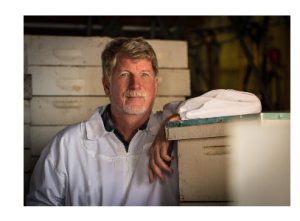 Keynote Speaker:
Keynote Speaker:
Dr. Jeff Pettis
President of Apimondia
Research Scientist and Consultant, Pettis and Associates LLC
Beekeeping in a Changing World: Fires, Floods, and Opportunities? – Dr. Pettis opened his presentation by stating that “we learn beekeeping from a mentor, but we have to be able to adapt [our learnings] as the world changes.” He discussed how climate change has led to unusual weather patterns, such as extreme temperatures, unpredictable rainfall and escalating natural disasters, all of which directly impact beekeepers and their bees. Additionally, he highlighted some indirect effects of the changing world like reduced honey production and broodless periods, which pose challenges for beekeepers in the long run. Dr. Pettis pointed out that traditional calendar-based beekeeping practices are becoming less reliable due to shifting blooming times caused by climate change. He also explained how research on the effects of rising CO2 levels has shown to have a negative effect on the concentration of protein in pollen changing the plant quality. He stressed that we are not doomed and that beekeepers can adapt by closely monitoring the needs of their bees in this evolving landscape. Most importantly Dr. Pettis touched on the fact that no beekeeper is alone in facing these challenges. He reassured the audience that there are solutions available, such as technological tools like hive scales for nectar monitoring and advancements in bee nutrition to counter changes in plant quality. He concluded by emphasizing that bees are constantly responding to the environment around them, and it is important for beekeepers to then respond to their bees.
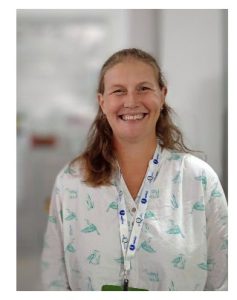 Maggie Gill
Maggie Gill
Regional Bee Inspector for Wales at the National Bee Unit
Tropilaelaps surveillance, distribution, prevention and management – All the way from Wales, Maggie Gill delivered two highly informative talks. Drawing from her research on the Tropilaelaps mite in Thailand, she shared valuable insights on how beekeepers can effectively monitor the spread of these mites. Maggie showcased an elaborate map tracing the emergence and expansion of Tropilaelaps mites into new geographical regions, noting South Korea’s significance due to its lower temperatures than previously believed survivable by the mites. Additionally, she emphasized that the primary transmission route is likely through ports, where the mites can hitch a ride on bees transported by shipping containers and boats. Maggie explored various traditional methods of monitoring, such as the bump method, alcohol shakes, sticky boards and sugar shakes. Each method was discussed in detail, highlighting the challenges faced when dealing with Tropilaelaps mites. The bump method was disruptive to hives, alcohol washes proved ineffective at separating the mites and sticky boards were not practical due to the mites’ size. She concluded that the sugar shake emerged as the most successful monitoring technique, as it was able to accurately represent the number of mites per shake.
National Bee Unit inspections program and Asian hornet prevention – The Asian hornet has been found in the UK, leading regional inspectors to implement an active reporting and tracking system. Maggie explained that with the hornets’ spread, more stringent measures were required to prevent their proliferation, as they pose a threat to honey bee colonies. The system relies on public reporting, where public awareness prompts the reporting of possible Asian hornet sightings. Subsequently, the inspection team reviews all reports and, upon confirmation, sets up bait stations in the reported area. Hornets visiting these bait stations are monitored with an app that automatically traces their flight path. By analyzing multiple flight paths and deploying additional bait stations, inspectors can pinpoint the nest location and eliminate it. Interestingly, Maggie mentioned that all nests are collected and examined to determine specific characteristics like lineage and the reproductive stage, aiding in determining if the hornets have established themselves in the UK.
Congratulations to the CAPA Student Merit Award Winners:
Rhonda Thygesen – Berry Sad Bees: Assessing Honey Bee Health Stressors in Highbush Blueberry with Proteomics
Courtney MacInnis – How honey bees respond to infection with Vairimorpha (Nosema) ceranae and Lotmaria passim
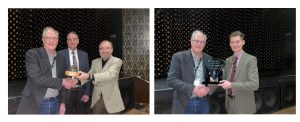 Congratulations to Dr. Rob Currie
Congratulations to Dr. Rob Currie
CHC Willie Baumgartner Memorial Award
CAPA Outstanding Service Award
CAPA Honorary Membership
The Manitoba Beekeepers’ Association (MBA) would like to nominate Dr. Robert William Currie for the Canadian Honey Council Willy Baumgartner Memorial Award for his outstanding contributions to honey bee research in Manitoba, Canada, and internationally.
Dr. Currie’s career started as a provincial student honey bee inspector in the mid-1970’s where he developed a keen interest in bees. He went on to obtain graduate degrees at the University of Manitoba and completed post doctoral work at Simon Fraser University. In 1991, he accepted a position as bee researcher at the University of Manitoba and for the last 10 years of his career, served as the Head of the Department of Entomology. Dr. Currie has also held various executive roles with the Canadian Association of Professional Apiculturists.
Dr. Currie’s career has revolved around applied research to help improve honey bee health. He continued the work of his predecessors on wintering techniques and Fall treatments of diseases and pests to help improve wintering success of healthy colonies. His early work on the biology of varroa helped the industry understand this new mite pest. Dr. Currie’s pioneer work on Formic Acid to control varroa mites lead to the development of treatment criteria, and he has been instrumental in improving our understanding of the impact of Nosema on wintering in Canada. Throughout his career, Dr. Currie was involved in collaborative research projects with other researchers while often doing the majority of the field work. Early on in his work, Dr. Currie was involved in determining syrup quality. His development of testing criteria for quality and its effect on the longevity of bees continues to be the standard today, yet he still works diligently to improve that standard through his current field trials.
Dr. Currie has written and contributed to 84 peer reviewed articles and was the major contributor to the chapter of Wintering in the updated version of the Hive and the Honey Bee. He also contributed to the writing of Beekeeping in Western Canada as well as the CAPA Honey Bee Diseases & Pests manual. Throughout his career, Dr. Currie has taught the U of M “Beekeeping for the Hobbyist” course which has trained hundreds of new beekeepers and has guest lectured at various beekeeping courses throughout the country and internationally.
Dr. Currie has presented at countless Provincial and Regional Association conferences as well as internationally, and has long been an advisor to the Manitoba Beekeepers Association.
The MBA board fully recognizes the importance of Dr. Currie’s influence on beekeeping in Manitoba and across Canada, and considers him well deserving of this award from the Canadian Honey Council.
—MBA Board of Directors
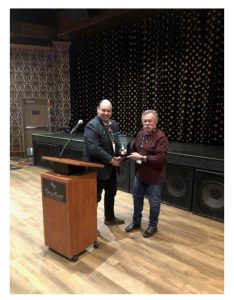 Congratulations to Tim Wendell
Congratulations to Tim Wendell
CHC Fred Rathje Memorial Award
Throughout his long and successful beekeeping career, Tim has been dedicated to improving the beekeeping industry. He has always graciously volunteered his time and efforts to serve beekeeping in Saskatchewan and beyond.
Tim has always been generous, sharing ideas and experiences with other beekeepers. With his ample experiences and fearless willingness to try new things, he has vast amounts of knowledge to share. He has spent many hours in meetings, giving presentations and in person passing on the successful ideas and techniques to help other beekeepers. This knowledge has helped to ensure a progressive, positive industry in Saskatchewan and beyond.
Tim has also been a very active member of the Saskatchewan Beekeepers Association (SBA). He was president for eight of the 14 years that he spent on the SBA board of directors. During his time on the SBA board, he was a driving force behind changes in the industry. He was instrumental in addressing many challenges the beekeeping industry faced over the years. These challenges include optimizing business risk programs like the Net Income Stabilization Account (NISA) to make the program work for beekeepers, representing Saskatchewan on national committees and working groups like importing queens from the United States, and so much more.
Honey bee research has always been near and dear to Tim. He has donated money, time, effort, bees and equipment; however, while he was president, Tim realized that more was needed, and what was needed was a commission. Tim led the initiative but worked with many others to establish the Saskatchewan Beekeepers Development Commission (SBDC). The main goals of the commission are to better support promotion of the industry and research. The legacy of this commission has been vast, enhanced support of many research programs, establishing the Saskatchewan Tech Adaptation Team to work directly on applied research projects, and more have all been offshoots from the implementation of the SBDC.
The achievements highlighted in the nomination are just the tip of the iceberg. Tim has had a long history of service to the bee industry. He has volunteered endless amounts of time, effort and resources for the betterment of beekeeping in Canada. Tim is an excellent candidate and is very deserving of the Fred Rathje Memorial Award.
—Nominated by Stan Reist.
Study Hall / Bee Tech
By: Jerry Hayes
I had the great opportunity to attend and speak at the 1st Canadian National Convention and Tradeshow, BeeTech, supported by Canadian Honey Council (CHC), Canadian Association of Professional Apiculturists (CAPA) / L’Association Canadienne des Professionels de l’Apiculture (ACPA) held in Calgary, Canada on February 8-10, 2024.
Canada has a strong, vibrant, economically significant managed honey bee industry. There are approximately 794.34 thousand colonies in Canada that are responsible for 20 million tons of oilseed canola and 200 tons of blueberry production. There are many other pollinator dependent crops but these are two of the most valuable crops that collapses without honey bees’ production.
Canada also is a leader in honey production with recent data showing 74.4 million pounds.
But you can’t have these positive outcomes if there is not significant honey bee research into pest, parasite and disease control, educational outreach, mentoring and inspections. In no particular order and hope I got most of them, University of Guelph, National Bee Diagnostic Center, York University, University of Alberta, University of Calgary, University of Lethbridge, University of British Columbia, Agriculture and Agri Food Canada/Beaverlodge Research Program, University of Manitoba, University of Laval and all the provincial apiarists https://apiaryinspectors.org/Canada-Inspection-Services. They have it well organized in Canada.
In my mind, all the talks were interesting and valuable. Not to ‘cherry pick’ or ignore any of the major speakers or student presentations but these are the ones that got my attention:
- Andony Melathopoulas – Getting a little respect while making my honey crop
- Jeff Pettis – The exotic world of beekeeping: new exotic threats like hornets and Tropilaelaps mites
- Panel: What should the relationship between the Canadian and U.S. beekeeping industries look like? Chris Hiatt, George Hansen, Simon Lalonde
- Jerry Hayes – Confirmation Bias
- CAPA PhD Award Winner, Courtney Macinnis – How Honey Bees respond to infection with Vairimorpha (Nosema) ceranae and Lotmaria passim
- Leslie Holmes – Queen Fertility in Response to Exposure to Antibiotics and Temperature Stress
- Samantha Muirhead – Canada and the Tropilaelaps mite, should we be concerned?
- Rob Currie – Assessing syrup quality. Does it matter what and when you feed your bees?
- Panel: Impacts of Honey Fraud Chris Hiatt, George Hansen, Kirk Wilson, Graham Strom
- Stephan Pernal – Intra colony transmission of wax borne honey bee viruses following irradiation and storage
And of course there were dozens of other talks sharing contemporary issues in ‘our’ industry.
All this to say the 1st Canadian National Convention and Tradeshow, BeeTech, supported by Canadian Honey Council (CHC), Canadian Association of Professional Apiculturists (CAPA) / L’Association Canadienne des Professionels de l’Apiculture (ACPA), was well organized, great location and the best part was being able to visit with so many commercial, sideline and hobby beekeepers. Those hallway and lunch and dinner conversations are always fun. We are all in this together. Let’s be sure we take time to connect, understand and support each other.




